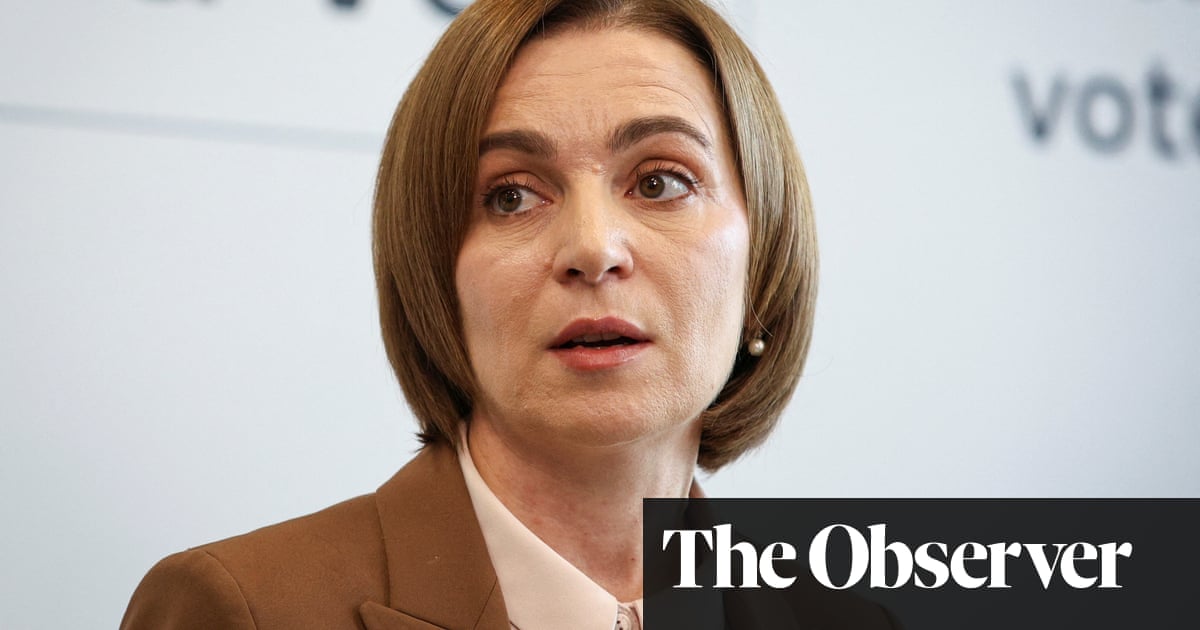Moldovans will head to the polls on Sunday for a second-round vote to choose between the incumbent pro-EU president, Maia Sandu, and a Russia-friendly challenger.
Despite securing 42% of the vote in the first round, Sandu faces a tough challenge in the runoff against an opposition bloc led by Alexandr Stoianoglo of the Socialist party, which aligns with Moscow.
The election in this small nation of under 3 million people in south-eastern Europe follows a referendum in which a slim majority voted in favour of pursuing membership of the EU.
Since the breakup of the Soviet Union, Moldova has gravitated between pro-western and pro-Russian courses. But under Sandu, a former World Bank adviser, the impoverished country has accelerated its push to escape Moscow’s orbit amid its war in neighbouring Ukraine.
The results of the referendum and first round of the election were marred by allegations of a Moscow-backed vote-buying scheme. Sandu and her allies have accused Russia and its proxies of leading a large-scale campaign involving vote-buying and misinformation to sway the election.
They accuse the fugitive Moldovan businessman Ilan Shor, a vocal opponent of EU membership, of running a destabilising campaign from Moscow.
“Moldova has faced an unprecedented assault on our country’s freedom and democracy, both today and in recent months,” Sandu told supporters in the capital of Chișinău after the election results were announced.
Before the vote, her team said it had “mobilised every available resource” to counter what they describe as “a sprawling Kremlin-backed vote-buying scheme”.
“Moldova has had a monumental task before it – just two weeks to stop a sprawling Kremlin-backed vote-buying scheme that proved effective in the twin vote on 20 October,” Olga Roşca, a foreign policy adviser to Sandu, told the Observer.
“Protecting the integrity of tomorrow’s runoff has required urgent, decisive action. Authorities, working around the clock, have been executing a twofold strategy: dismantling the network and deterring would-be participants,” Roşca added.
“Every available resource has been mobilized—from law enforcement to public service announcements in trolleybuses and supermarkets,” the advisor said.
after newsletter promotion
The tight results of the EU referendum have weakened Sandu’s standing, placing her in direct opposition to former prosecutor general Stoianoglo, who exceeded expectations with 26% of the vote on the Party of Socialists’ ticket.
In the presidential debate, Sandu accused Stoianoglo of being a “Trojan horse” candidate for outside interests bent on seizing control of Moldova.
Stoianoglo has denied working on behalf of Russia. In an earlier interview with the Observer, he claimed that he was in favour of joining the EU, but boycotted the vote, calling it a “parody.”
He has also declined to criticise the Kremlin for its invasion of Ukraine and called for improved relations with Moscow. “The level of Russian interference in Moldova is highly exaggerated,” he said, adding that he would seek a “reset of relations” with Moscow.
While Russia’s invasion of Ukraine has shocked many in Chișinău, just a few hours’ drive from Ukraine’s Black Sea port city of Odesa, the Kremlin’s shadow still looms large. Moscow has 1,500 troops stationed in Transnistria, a region run by pro-Russian separatists who broke away from Moldova’s government in a brief war in the 1990s.
The vote comes after Saturday’s parliamentary election in Georgia, another ex-Soviet country trying to join the EU, where a ruling party viewed by most countries as increasingly Moscow-friendly and anti-liberal won an vote that was marred by reports of voting violations and fraud.

